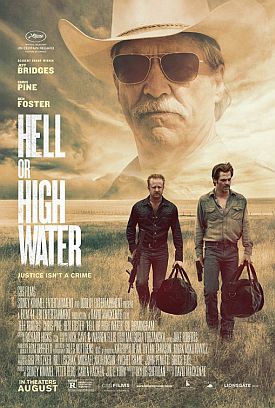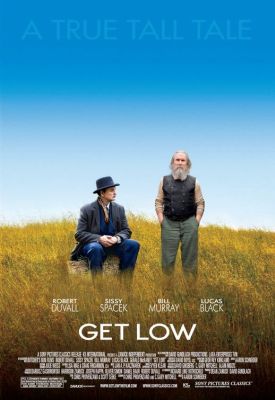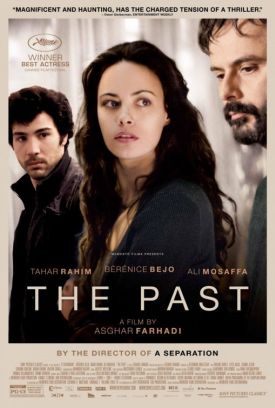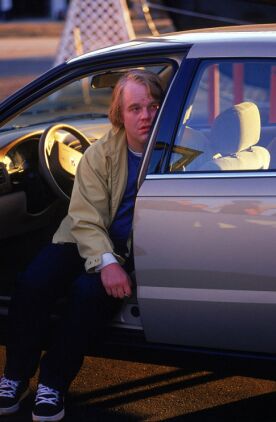Four Lane Highway
Boy! I thought movies like Dylan McCormick’s Four Lane Highway went out with the 1960s. And a good thing too. A sensitive young man named Sean (Fred Weller) who aspires to a literary career denies his vocation because his now-deceased daddy, a famous author, was mean to him years before and told him he had no talent — even though he had published a story in The New Yorker! Daddy said they only accepted it because of who his father was. Sean’s long-suffering girlfriend, Molly (Greer Goodman), must soothe his tortured soul and once again persuade him of his self-worth. Sean, by the way, is 34 years old. When he asks his best friend, Lyle (Reg Rogers), why they’re still living the irresponsible and promiscuous lives of college kids, the latter replies: “Because we can.”
It’s the one true thing said in the movie. Even if there’s anybody — apart from the self-pitying auteur — that wants to bring this adolescent tosh back before the public, it can’t really be done today. We lack the innocence that was once willing to look on people like Sean as semi-tragic figures rather than narcissistic twerps. Go back now and watch even so fine a film as Five Easy Pieces (1970) and you’re likely to be struck by the falsity and staginess of Jack Nicholson’s romantic neuroses. And he didn’t get loved out of them, not even by the pulchritudinous tag-team of Karen Black and Susan Anspach. Besides, the bad-dad movie has moved on since those days. There is a sort of recognition of this in Mr McCormick’s making the old man a drunk as well as a meanie and an authoritarian.
The spectre of “dysfunction” thus hangs over the proceedings, as well as wounded self-esteem, when Sean himself starts to abuse alcohol. “The apple doesn’t rot far from the tree,” as he puts it. It may or may not be a relevant detail that Lyle is much worse than Sean: a serious alcoholic who has to come to terms with the fact. He also, not coincidentally, has his own bad-dad problem, being estranged from his father, a big shot business executive, because of his radical left-wing political views. Or are his radical left-wing political views a product of being estranged from his father? Either way there is an embryonic sub-plot in Lyle’s story which strikes me as potentially a lot more interesting than the main one and which at least might have thrown some light on Sean’s predicament. But it dies a-borning.
In spite of these fatal flaws, Four Lane Highway might have been easy enough to take if it had been cut by half an hour and the elaborate narrative framework scrapped. For the story is told in a confusing series of flashbacks. In the present, Sean and Molly have been apart for two years. An artist, she has moved back to New York from the small college town in Maine where she was teaching when they were together and where Sean now works as a bartender and a construction worker, having lived there most of his life. When a show of her paintings is announced by a New York gallery, Sean and Lyle go to see it, and her. Their road trip in Sean’s old Ford pickup with the camper top provides the first occasion for flashbacks during which the story of his romantic involvement with Molly is told.
But once he has got into the habit, Mr McCormick can’t stop himself from indulging in it again and again. In fact, his addiction appears to the outsider to be almost as bad as Lyle’s. He’s a flashback-oholic off the wagon, constantly and irritatingly interrupting his own story of Sean and Molly’s re-encounter in the present with far more detail about their past as co-habitees than we can possibly care to have or, having, make any use of. Of course the reason is not far to seek. For it’s the past that contains all the juicy tortured-soul stuff and thus all Mr Weller’s best opportunities to put on the Jack Nicholson shtick — except that he’s far too innocuous a character to bring it off.
In the present we’re meant to see Sean as getting his act together, and everybody knows that suffering and dysfunction are more cinematically compelling than recovery. Thus, in organizing his film the way he does, Mr McCormick unwittingly points up the phoniness of its premiss. Like one of those old timey melodramas that smuggled prurience in under the cloak of moral didacticism, Four Lane Highway uses its inspirational and therapeutic carapace as a pretext for pain-porn. And even if you’re into pain-porn, the sufferings of so pathetic a wimp as Sean are unlikely to impress you — unless you are about 16 or are suffering from a case of arrested development as serious as his own.
Discover more from James Bowman
Subscribe to get the latest posts to your email.








